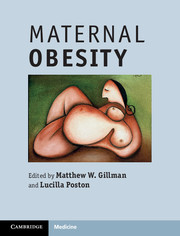Book contents
- Frontmatter
- Contents
- Contributors
- Preface
- Section 1 Trends and determinants of obesity in women of reproductive age
- Section 2 Pregnancy outcome
- 4 Maternal outcomes in obese pregnancies
- 5 Potential mechanisms contributing to gestational diabetes and pre-eclampsia in the obese woman
- 6 Fetal and infant outcomes in obese pregnant women
- 7 Obesity in pregnancy and mental health
- Section 3 Long-term consequences
- Section 4 Interventions
- Section 5 Management and policy
- Index
- Plate Section
- References
7 - Obesity in pregnancy and mental health
from Section 2 - Pregnancy outcome
Published online by Cambridge University Press: 05 August 2012
- Frontmatter
- Contents
- Contributors
- Preface
- Section 1 Trends and determinants of obesity in women of reproductive age
- Section 2 Pregnancy outcome
- 4 Maternal outcomes in obese pregnancies
- 5 Potential mechanisms contributing to gestational diabetes and pre-eclampsia in the obese woman
- 6 Fetal and infant outcomes in obese pregnant women
- 7 Obesity in pregnancy and mental health
- Section 3 Long-term consequences
- Section 4 Interventions
- Section 5 Management and policy
- Index
- Plate Section
- References
Summary
Introduction
There is increasing recognition internationally that the physical health of people is only possible if they are also mentally healthy [1]; this is even more pertinent in pregnancy where a mother’s mental health can impact not only on her physical health but also the health of her baby in utero [2]. Obesity and mental health problems are both important causes of maternal deaths in the UK and other industrialized countries [3–5]. This chapter therefore aims to review the evidence on how obesity in pregnancy is related to mental disorders and the implications of this for the management of obesity in pregnancy.
The mental disorders we will focus on are often grouped together as severe mental illness, common mental disorders, and binge eating disorder (other eating disorders and learning difficulties are beyond the scope of this chapter). The main international classifications of mental disorders are the World Health Organization (WHO) ICD classification [6] and the American Diagnostic and Statistical Manual of Mental Disorders (DSM-IV) [7], both of which are currently being revised and updated (ICD-11 and DSM-V will be appearing in the next few years). We will use the current definitions in ICD-10 predominantly, other than for binge eating disorder, which is only included in the DSM classification currently (see also below).
Keywords
- Type
- Chapter
- Information
- Maternal Obesity , pp. 70 - 80Publisher: Cambridge University PressPrint publication year: 2012
References
- 1
- Cited by

